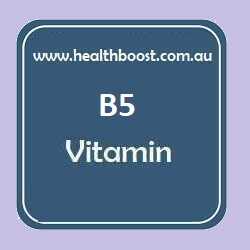Vitamin B5:
 Vitamin B5, also known as pantothenic acid, is a water-soluble vitamin that is essential for human health. It is involved in many important bodily functions, including the production of energy, the synthesis of hormones, and the maintenance of healthy skin, hair, and nails.
Vitamin B5, also known as pantothenic acid, is a water-soluble vitamin that is essential for human health. It is involved in many important bodily functions, including the production of energy, the synthesis of hormones, and the maintenance of healthy skin, hair, and nails.
Vitamin B5 is found in a variety of foods, including meat, poultry, fish, eggs, dairy products, whole grains, legumes, and vegetables. It is also available as a dietary supplement.
The recommended daily intake of vitamin B5 for adults is 5 milligrams (mg) for men and 5 mg for women. Pregnant and lactating women need slightly more vitamin B5, at 6 mg and 7 mg per day, respectively.
Vitamin B5 deficiency is rare. However, it can occur in people with certain medical conditions, such as malnutrition, alcoholism, and Crohn’s disease. Symptoms of vitamin B5 deficiency can include fatigue, muscle cramps, headache, nausea, and vomiting.
Benefits of vitamin B5:
Improved energy levels: Vitamin B5 is involved in the production of energy from food. It helps to convert carbohydrates, fats, and proteins into energy that the body can use.
Healthy skin, hair, and nails: Vitamin B5 is essential for the production of keratin, a protein that is found in skin, hair, and nails. It helps to keep skin hydrated and prevents hair and nails from becoming brittle.
Reduced stress: Vitamin B5 helps to produce adrenal hormones, which help the body to respond to stress. It also helps to regulate the production of cortisol, a stress hormone.
Improved cognitive function: Vitamin B5 is involved in the production of acetylcholine, a neurotransmitter that is important for learning and memory.
Reduced inflammation: Vitamin B5 has anti-inflammatory properties. It may help to reduce inflammation in the body, which can improve overall health and well-being.
Overall, vitamin B5 is an important nutrient that plays a vital role in many aspects of human health. Most people can get the vitamin B5 they need from a healthy diet. However, people with certain medical conditions or who are following a restrictive diet may need to take vitamin B5 supplements.
Sources:
Meat and Poultry: Beef, turkey, chicken, and pork are good sources of vitamin B5.
Eggs: Both the yolk and the white of eggs contain vitamin B5.
Fish: Salmon, tuna, trout, and other types of fish contain vitamin B5.
Dairy Products: Milk, cheese, yogurt, and are rich in vitamin B5.
Legumes: Lentils, black beans, chickpeas, and other legumes are good sources of vitamin B5.
Whole Grains: Whole grains like oats, barley, brown rice, and whole wheat contain vitamin B5.
Vegetables: Some vegetables are sources of vitamin B5, although in smaller amounts compared to other foods. Examples include broccoli, avocados, sweet potatoes, and mushrooms.
Nuts and Seeds: Sunflower seeds, almonds, peanuts, and other nuts and seeds contain vitamin B5.
Fortified Foods: Some processed foods, such as breakfast cereals and energy bars, are fortified with vitamin B5.
If you are considering taking vitamin B5 supplements, it is important to talk to your health practitioner first. Your doctor can help you to determine if vitamin B5 supplements are right for you and can recommend the best dose for your individual needs.
Vitamins:
Other beneficial natural products:
